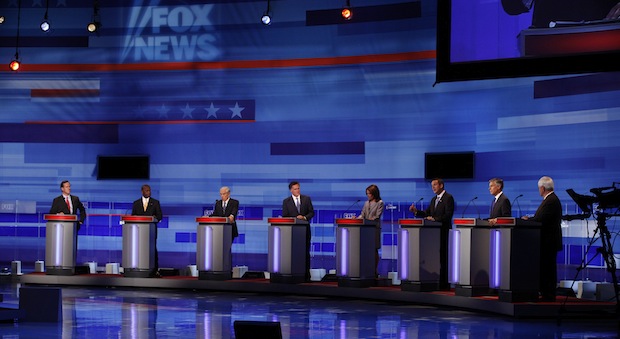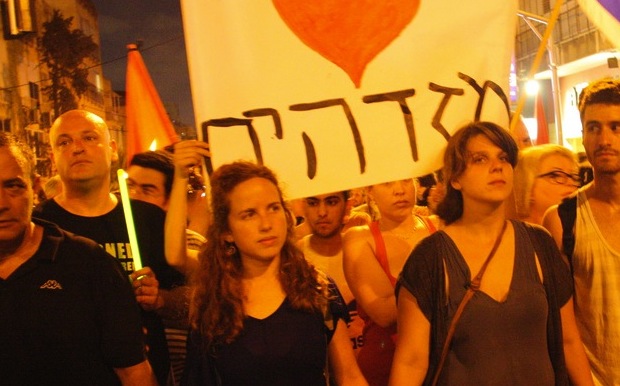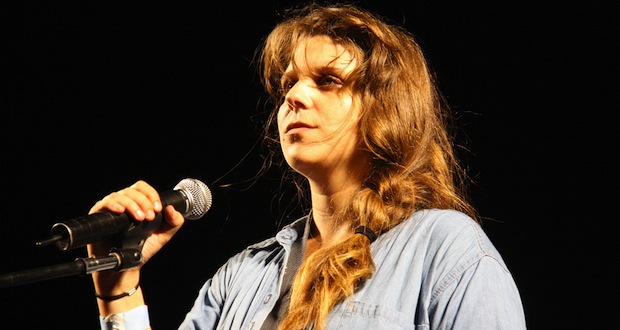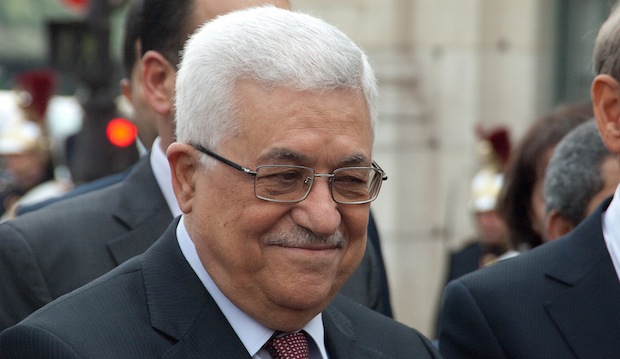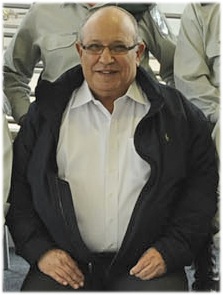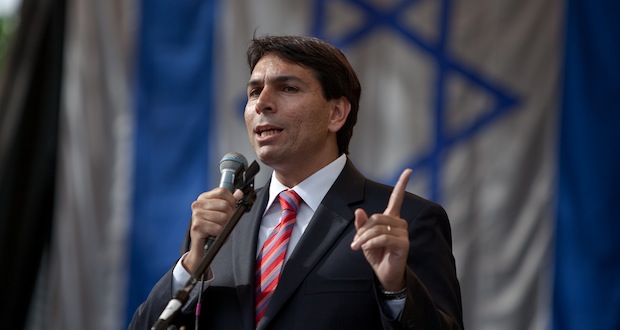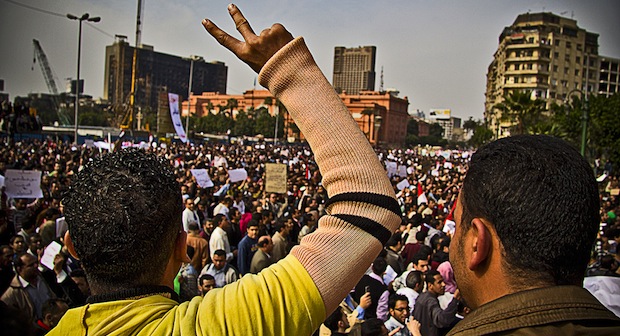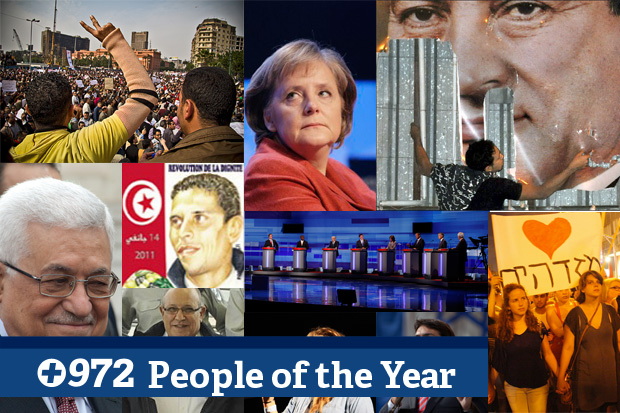
One would be hard-pressed to name a dull year in the history of the Middle East, and 2011 was no exception. It shares its beginnings with a domino effect of popular protest, sparked in Tunisia, which would ultimately see the fall of regimes whose iron fists had been decades-old fixtures. Even Israelis suddenly seemed to share grievances with their neighbors, with hundreds of thousands joining the largest protest movement in the country’s history.
But the hopes voiced in the streets of the world have been matched by crackdowns – notably in Syria, to this day – and diplomatic deterioration. Europe hovers on the verge of disintegration. Jerusalem’s threats against Iran conjure images of Armageddon. A government assault on basic freedoms, long the status quo for Palestinians, is expanding to target Israeli civil society. The drama surrounding the Palestinian statehood bid at the UN made peace more a fantasy than ever, highlighting both the U.S. administration’s submission to interests from the right, and its irrelevance to a meaningful peace process.
Never a dull moment. We at +972 have attempted to bring you, our readers, reporting and commentary as events unfolded. Below you will find our bloggers’ picks of the people who defined 2011. Click here to read about the +972 team’s selection of top person of the year.
— Noa Yachot
Mohamed Bouazizi: Catalyst for revolution
There are many obvious differences between Archduke Franz Ferdinand and Mohamed Bouazizi. The former was the heir to the throne of Austria-Hungary, the latter a poor fruit-seller from a provincial town in Tunisia. Yet, both of their deaths precipitated a cataclysmic event, or series of events, that shook the entire world. The assassination of Archduke Ferdinand in Sarajevo was the catalyst for World War I. Bouazizi’s self-immolation in front of a municipal building in the town of Sidi Bouzid was the spark that lit the fire of revolution in the Middle East.
The Arab Spring has largely been the revolution of the nameless protester. It is unclear whether Bouazizi’s name will sink into this same obscurity or rise above into our historical lexicon as one of the few names associated with this significant moment in our time.
Bouazizi came to the world’s attention in a cry of desperation that ignited in a blaze of flames. His plight in life was one shared by so many people: poor, struggling, cast aside by the powers that be. Bouazizi reached his breaking point when a couple of municipal inspectors confiscated his fruit cart and a policewoman slapped him across the face for his imprudence. His attempts to secure justice from the system were callously rebuffed. Yet, the fashion of his death—more synonymous with Buddhist monks than Arab street peddlers—sparked something in the hearts of his countrymen and women that took on a life of its own. It eventually led to the toppling of Zine al-Din Ben Ali and spread to Egypt, a much larger country whose masses shared much of the same hopelessness as Bouazizi. From there, the fires still rage across the region, and indeed, around the world.
Today, Bouazizi’s name hangs on the balance of prominence and oblivion. His face can be seen on the placards of protesters around the world. Nonetheless, most people would fail to conjure his name if asked. Only time will tell what the fate and legacy of Mohamed Bouazizi will be.
— Omar Rahman
The GOP Presidential Candidate
This year, the American GOP presidential candidate has succeeded in exposing just how ambiguous and dangerous the “pro-Israel” concept is in geopolitics. Republican candidates, now deep into the race that will determine who goes up against Obama in 2012, are throwing around “pro-Israel” statements left and right to serve their own interests. In the effort to win over Jewish money and votes, solidify the backing of the evangelical community (best represented by Zionist anti-Semite Glenn Beck) and pander to Americans who are generally hostile towards Muslims and the Arab world, the GOP candidates repeatedly affirm the definition of being “pro-Israel” that neatly aligns with the hard right in Israel.
Rick Perry has asserted that the Israeli settlement project is perfectly legal. Mitt Romney has repeatedly accused Obama of “throwing Israel under the bus” for, in effect, doing absolutely nothing to change the policies of the Israeli government. Newt Gingrich topped the headlines recently by stating that the Palestinians are simply an “invented” people. The GOP has presented an unequivocal definition of “pro-Israel,” in which there is no occupation and no reason to give up an inch of the West Bank or reach a solution with Palestinians. Obama, concerned with ensuring his reelection, has capitulated to the pressure. Despite American policy condemning Israeli construction in East Jerusalem, Obama continues to stand by as settlements are built and assure of the unbreakable bond between Israel and the United States, positioning the latter against the Palestinian bid for statehood at the United Nations in the fall.
Some boast that Israel’s influence on American politics shows just how important its security is to the United States. In fact, it actually demonstrates just how carelessly Israel and its future can be used and manipulated for political gains that are completely out of touch with what is best for those actually living in Israel and Palestine.
— Mairav Zonszein
Daphni Leef and Stav Shafir: Tent protest leaders
Last September, Daphni Leef and Stav Shafir, the best-known leaders of Israel’s social protest movement, agreed to appear on Lior Shlein’s popular Channel 2 talk show. They weren’t told that the show would broadcast from the settlement of Ariel, a focus of recent political controversies. Shlein even sent out a press release declaring that the leaders of the national protest were coming “to support the settlement.” They were trapped: Canceling the appearance would seem like a form of boycott – a controversial, even illegal, act; appearing could alienate the entire left and betray their own values.
Leef and Shafir refused to come to Ariel and were interviewed from Tel Aviv. But this nasty trick was just one in a series of attempts by the Israeli right to kill the J14 movement, after recognizing it as the single greatest threat not only to Netanyahu, but to the entire social and political order.
Looking back on the summer demonstrations, the biggest Israel has ever known, it’s easy to claim they ended with nothing, or that they failed to engage the most urgent political questions – in particular, the occupation. But such claims betray both a shallow understanding of the political process, and a failure to appreciate the challenges facing true subversive action in Israel. In a society built on ethnic segregation, a direct challenge to the system would have made J14 a marginal movement, like many other progressive groups. The brilliance of J14 is in having introduced a discourse of rights through the back door of the economy. Yet make no mistake: this is a conversation that would lead to the question, “Rights for whom?” and inevitably, with the Palestinian issue.
Together with others, Leef and Shafir kept the J14 movement from representing only the Jewish middle class. They refused nationalist symbols, and didn’t agree to cancel demonstrations during times of military escalation. They insisted on Palestinian speakers in big rallies – anyone well-acquainted with the issues should understand how hard it would have been to imagine a Bedouin woman speaking about unrecognized villages before tens of thousands in the southern town of Beer Sheva. Unlike many loud critics, Palestinian citizens recognized this, and supported J14 in huge numbers. J14 created a new generation of political activists, who will continue influence the political system in years to come.
Even if the young women don’t lead another rally, we are indebted to them for presenting us with a whole new field of opportunities. As Israel approaches what seems to be its darkest political hour, this is no small thing.
— Noam Sheizaf
Daphni Leef: The hypocrisy of J14
Daphni Leef caused a storm this summer when she pitched a tent and raised a proverbial flag in the name of “social justice.” But somehow, she never got around to mentioning the occupation and the racism coursing through Israeli society.
In September, as the last tents of the J14 movement were coming down, Leef made a comment that illustrated, beyond a shadow of a doubt, how oblivious she is to the big picture.
Following a meeting with Interior Minister Eli Yishai, Leef remarked that Yishai is man from whom Foreign Minister Avigdor Lieberman has something to learn.
Yup, thats the same Yishai who said that foreigners “bring… a profusion of diseases,” to Israel. The same Yishai who said that the Israeli-born children of migrant workers should be “put on planes.” The same Yishai called for and extension on the ban on family reunification for Palestinian citizens of the state and their spouses in the Occupied Territories. The same Yishai who called to revoke the citizenship of Palestinian citizens of Israel who are “disloyal” to the state.
According to Leef, Lieberman—who has advocated for the transfer of Palestinian citizens of Israel to a Palestinian state—has something to learn from Yishai.
Her gushing review of Yishai went as follows (translated from the Hebrew):
Eli Yishai was ‘a man’ and left the government meeting… It just reflects that also inside the system there are people that understand there is no right or left, Haredim or seculars, Arabs, Jews, just moral and non-moral, humane and not humane. In short, good job Eli. Lieberman has something to learn.
Her comments provoked members of several human rights organizations to express their outrage to me, off the record. When asked to go public, the response was two-fold: J14 has become a sacred cow; organizations that question Israeli policies must present a united front.
The popularity of Leef’s movement thus speaks to the shallow, self-centered and cowardly nature of the “social justice” movement in Israel.
— Mya Guarnieri
Palestinian Authority President Mahmoud Abbas
Mahmoud Abbas faces challenges unknown to most other leaders in the world. He leads a nation, half of which lives in diaspora, the other half under occupation. Those in Palestine are divided by roadblocks, checkpoints and walls – on top of politics and internal conflict. He must provide millions of Palestinians in the West Bank and Gaza with health services, education, other social services and a level of internal security. He must do all this without a stable economy and with a slew of pressures and restrictions imposed by Israel. He must depend on foreign donors without allowing them to dictate Palestinian politics.
Arafat used to say that if the Palestinian cause is absent from global media, then we have lost our struggle. In 2011, Abbas was successful in resurrecting the Palestinian cause and bringing it to the fore of the international community’s attention. He reminded everyone that Palestinians continue under occupation, and that the world has been watching for decades without essentially lifting a finger.
When Abbas stood at the United Nations podium in September and delivered his fiery speech, millions of Palestinians watched, proud of their leader. Celebrations filled the streets of Palestine. Even those who disagreed with Abbas’ vision couldn’t deny the importance of his achievements. He wasn’t just telling the world of the tragedy of the Palestinians, but reminding them of their responsibility to correct the course and bringing overdue freedom to Palestine.
Abbas realized that Israel and the United States’ monopoly over peace talks will lead nowhere, and was not afraid to speak the truth to unjust world powers. His appeal to the world and the United Nations was a brilliant effort in pulling the carpet from under America’s feet. He changed the dynamic of the Israeli-Palestinian conflict and the tools of the Palestinian struggle. Abbas demonstrated courage, shrewdness and patriotism where few Palestinian leaders have.
— Aziz Abu Sarah
Meir Dagan, former Mossad chief
The greatest threat facing the Middle East and the world is that Israel, the United States or a combination of the two will attack Iran’s nuclear facilities. This could set off a regional war, even a nuclear war, and the results could be catastrophic. But this is what Israel has been threatening to do for years now, and until 2011, there had been no real domestic opposition to this campaign. There was no questioning and no debate – everyone nodded their heads as one pillar of the country after another said we must bomb Iran or risk Holocaust II.
Then Meir Dagan left the directorship of the Mossad and started speaking out. Now there is an opposition, people are questioning, there is a debate, and Netanyahu and Barak do not enjoy as smooth a drive to Armageddon as they once did. Dagan stood in front of the moving tank all by himself. Because of the enormity and immediacy of the threat, because of the effect of his words and because he acted alone – he is my choice for 2011 Person of the Year.
Dagan didn’t mince words, calling an Israeli attack on Iran “the stupidest idea I’ve ever heard…The regional challenge that Israel would face would be impossible.” And he named names, explaining that he was speaking out because “there is no one to stop Bibi and Barak,” now that he, Shin Bet chief Yuval Diskin and army chief Gabi Ashkenazi were no longer around to “block any dangerous adventure.”
His enemies, beginning with Bibi and Barak, accuse him of acting out of personal ambition to secure himself a safe place on some party’s Knesset list. What cowards. Dagan retired last year as the unchallenged god of Israeli security – he could have written his own ticket into politics, and any party would have begged him to be its candidate for defense minister. By speaking out, by opening himself to charges of disloyalty, Dagan relinquished his perch at the top of the establishment for the sake of conscience and patriotism. Against the backdrop of Israeli darkness of the past year, his personal example has been incandescent.
— Larry Derfner
German Chancellor Angela Merkel
Israelis, Palestinians and all the peoples of the Middle East have had too much of their own turmoil over the past year to worry about external events. But they should. The global financial crisis, which began in the United States in 2008, has shifted its center of gravity to Europe, and is much worse there than it ever was on the other side of the Atlantic. The continent may be facing its most important challenge since the fall of the communist bloc two decades ago, and its most severe crisis since the end of WWII.
Should the European Union collapse and its members plunge into acute financial distress, the repercussions will be felt far and wide. Despite the significant weight of the United States in Middle Eastern affairs, the region’s connections with Europe are just as important, if not more so. Instability and economic depression in Europe will make it much more difficult for fledgling Arab democracies to establish themselves successfully, and for the Palestinians to fulfill their rights.
While Angela Merkel, the German chancellor, did not cause this crisis, her actions and decisions have exacerbated it. Decisive leadership in early 2011 could have contained the crisis on Europe’s periphery, before it infected core countries like Spain and Italy, and maybe even France and Germany itself. Merkel was not just passive, she actively opposed and still opposes painful and politically unsavory “bailouts” that would nonetheless be a lot less costly than the collapse of the common European currency.
At the same time, she still holds the key to a breakthrough that would avoid a nightmare scenario of financial and political chaos. Either way, her leadership and decisions in 2012 will shape the world and the Middle East, in 2013 and years to come, perhaps even trumping more easily understood and visible events like the Arab Spring.
— Roi Maor
The Likud party backbencher
They’re not the sharpest spoons in the drawer, but they lead us to hell in a handbasket.
Every Likud backbencher is horrible in his own way: We have Ophir “McCarthy’ Akunis, whose claim to fame is being Netanyahu’s right hand; Danny “there is a left-wing fifth column in Likud” Danon; Yariv “smash the leftists” Levin; Miri “Are you stupid” Regev; and various others.
What they have in common is being a group of hounds, spurring each other every week to more and more attacks on the ragged remains of the Israeli left and civil liberties, particularly those of the minority. They’ve found that there’s political gold in persecution.
Surprisingly, however, the public does not support them. Most say that the attack on civil liberties harms Israel and that they are opposed to it. Now, it would be probably fair to say that the majority opposes the legislation because of damage to Israel’s standing. But still, they oppose it. So why do Danon and the rest of the pack bay so loudly?
The problem lies with the primaries voters, who, to a large extent, are composed of settlers. It’s a long-known fact that there are far more Likud members in the settlements than Likud voters. The Likud has been infiltrated by a fifth column of Jewish extremists – including, for instance, the authors of the infamous “Torat Ha’Melekh” – which executes a quiet takeover of the political system. It’s no wonder Netanyahu can’t seriously fight Jewish terrorism – the terrorists have a strong base of support within his own party.
Watch the Akunises, the Danons and the Levins dance, and you can dimly see their true masters. The kooks on the hills can comfort themselves with the fact that, as Israel’s international situation grows worse and the country drifts further from the West, Jehova will have no choice but to intervene and save his children. Their Likudnik playthings cannot even use this excuse.
— Yossi Gurvitz
Hosni Mubarak, former Egyptian president
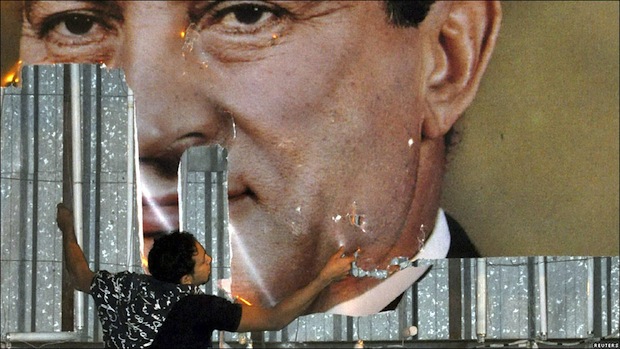
After Zine el-Abidine Ben Ali of Tunisia fled to Saudi Arabia when his country rebelled, he was tried and convicted in absentia for corruption of gigantic proportions. Ali Abdullah Saleh of Yemen was almost killed in his people’s uprising; he has since promised to transfer power, but hasn’t yet. Colonel Qaddafi had to go the hard way, denying his demise right up until it devoured him.
For each, the end was inauspicious, not totally satisfying. Ben Ali evaded both justice and extradition orders. Saleh might still get an immunity deal. Qaddafi’s blood may have been cathartic, but it foreshadows darkness for the future political culture of Libya.
But Hosni Mubarak, after his spectacular implosion, was the only Arab leader brought to trial. The initial proceedings in August provided a momentary taste of live justice, in the flesh. Despite grave problems with the process, still I prayed that the symbolism of seeing their dictator succumb to the law as a mere man – old, sick and most of all, mortal – would penetrate the minds of those who suffered decades of spiritual, political and physical starvation under his rule.
In her brilliant 2002 book “The Juridical Unconscious,” Professor Shoshana Felman explores highly public legal events that serve to exorcise trauma. Such a trial, she believes, can give voice and record to horrors that were formerly hidden and fragmented inside individuals. “Justice by trial and by law,” she writes “has become civilization’s most… ultimately meaningful response to the violence that wounds it,” because it channels and unleashes the trauma.
Perhaps social and political healing will follow. Maybe the “Post-Mubarak Egypt” will see the end of cultural forced and self-censorship, rising gender equality, advances for a desperately needed new constitution and greater media freedoms.
But symbolic trials, Felman warns, can also unwittingly re-enact the trauma. As an NPR reporter said “It’s not only Mubarak on trial [Egyptians] say, but the future of their revolution.” Mubarak’s trial was suspended since October, and similarly, the revolution now hangs by a thread between progress and chaos. Yet proceedings resumed days before the end of the year. Egypt too will eventually find its path to freedom.
— Dahlia Scheindlin
“The people”
There are few things as maligned, abused and misrepresented as huge anonymous collectives, most often known as “the people.” For every movement that has arisen to demand more rights and dignity on behalf of “the people,” you will find five governments withholding rights and denying dignity, also in the name of “the people”; more often than not, the latter is the product of the former. The same applies to “the working class,” “the middle class,” “the Jews,” “the Palestinians,” “the silent majority,” “the Umma,” and so on and so forth. A leadership either self-appointed or installed by a self-appointed electoral college takes up the right to represent these collectives, and wheel and deal on their behalf.
It is for this reason that the most inspiring moment of the first year of the global spring is not that the people are rising, but how they rise. Although the long-term outcomes remain to be seen, at their best and most powerful moments the movements dispensed with leaders, professional revolutionaries and party structures; instead, they have set up popular assemblies, ruling by consensus and ensuring everyone had a say. The experience of having that say and being listened to is what drew people to the tent camps and the squares; suddenly, the alienation of the big cities, the classes and the creeds was cracking, and you found that your opinions mattered, were listened to sympathetically by a group of complete strangers and became part of the fabric of the general strategy.
The informality and resilience of these assemblies ensured there were no leaders to cut deals with the governments, and the fact most movements have not yet been coopted is largely due to them. This winter the movements are readjusting and recalibrating, but one hopes that the spirit and horizontal hierarchies of the popular assemblies endure – because they are the only thing that gives any true power and meaning to that vague, vacuous term “the people.”
— Dimi Reider
——————————–
Read also:
+972 Person of the Year 2011: Woman activist of the Arab world
+972 Magazine’s 10 most-read posts of 2011
+972 Magazine’s People of the Year 2010
+972 Magazine’s Person of the Year 2010: Abdullah Abu Rahmah


